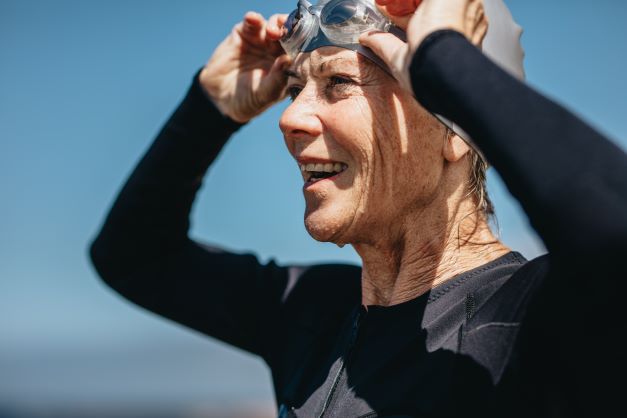Benefits of swimming
As a nation surrounded by water, swimming is one of the most popular sports in Australia and one of our great passions. It is a fun and great way to keep fit, stay healthy and make new friends all while participating in a low-impact activity that has many physical and mental health benefits for all ages.
Swimming is an excellent way to work your entire body and cardiovascular system and an hour of swimming burns almost as many calories as running, without all the impact on your bones and joints.
There are so many benefits you may gain from swimming regularly. Therefore, if you want to start a new exercise program or you are looking to try something new, jump in the pool and give it a go, you will soon notice the benefits to your mind, body, and soul.
Health benefits of swimming
Swimming is a great all-round activity that has many health benefits including:
- keeping your heart rate up without stressing your body
- building endurance, muscle strength and cardiovascular fitness
- helping to maintain a healthy weight, healthy heart and lungs
- toning muscles and building strength
- being a great resistance training, as water creates 12-14% more resistance than air
- swimming puts very little pressure on your joints and is a good workout at any age
- It assists in improving coordination, balance, posture and flexibility
- providing an all-over body workout, as nearly all of your muscles are used during swimming.
Other benefits of swimming
Swimming not only has the above benefits to your body and health, it is a relaxing and calm form of exercise that can be enjoyed alone or with others. It is easily accessible (for most) as it’s available in many places; you can swim in pools, oceans and rivers – just make sure to choose a safe swimming environment.
It is also an affordable activity, compared to some other exercising options, that requires little equipment and a relatively affordable cost to access swimming pools, or no cost at all.
However, there are many more benefits of swimming as well.
Works your insides, too
While your muscles are getting a good low impact workout, your cardiovascular system is also being worked out. Swimming makes your heart and lungs strong and may help lower blood pressure and control blood sugar.
Suitable for people with injuries, arthritis, and other conditions
Swimming can be a safe and low impact exercise option for some injuries and conditions such as arthritis, asthma, multiple sclerosis (MS), injuries, disability, and other issues that make high-impact exercises difficult.
Swimming may even help reduce some of your pain or improve your recovery from an injury.
People with multiple sclerosis (MS) may also find swimming beneficial. Water makes the limbs buoyant, helping to support them during exercise. Water also provides a gentle resistance. Studies have found that in some cases of MS and regular swimming, people showed improvements with symptoms like fatigue, depression, and disability.
The humid environment of indoor pools makes swimming a great activity for people with asthma. Not only that, but breathing exercises associated with swimming, such as regularly holding your breath, may help lung capacity and gain control over your breathing.
Please always talk to your doctor about the potential risks of swimming and starting a new exercise routine first, especially if you are suffering from an injury, MS or asthma.
Burns calories
Swimming is an efficient way to burn calories and unlike running and walking it is a whole body workout, not just the lower body. There are many things to take into account, such as a person’s weight and their exercise intensity/speed, however overall swimming at a moderate pace will burn a little less than running for the same amount of time, but more than walking for the same amount of time. However, over time it has been shown that swimmers can burn up to 25% more calories than runners, as runners generally slow down as they go further and swimmers tend to sustain their pace longer.
Either way swimming is a great all over body exercise that like running burns a significant amount of calories.
Improves your sleep
Swimming may help you sleep better at night. As an aerobic exercise, studies have found that swimming can assist with insomnia and a better quality night’s sleep. This can make swimming a great choice for older adults looking to improve their sleep.
Boosts your mood
Like most exercise, studies have shown improvements in mood from people participating in an aquatic program. Swimming and aquatic workouts can be psychologically beneficial to you no matter what your age.
Helps manage stress
Research done on regular swimmers has found that stress levels from before and after a swimming session are dramatically less and although more research is needed in the area, it concluded that swimming is a potentially powerful way to relieve stress quickly.
Getting started
Getting started in swimming is easy. Firstly, you will need a pair of swimmers and some goggles and in most cases a towel. There are public pools throughout Australia that are open to everyone. Many gyms and community centres offer lap swimming times as well as water aerobics and aqua-jogging classes. Entry to public pools is relatively inexpensive. If you are new to swimming you will probably benefit from swimming lessons, to learn the different swimming strokes, breathing techniques, and other handy tips for getting the most from your workout. Most aquatic centres offer swimming lessons for people of all ages, as well as training and exercise groups.
Once you know the basics, try swimming laps for 20 to 40 minutes at a pace that keeps your heart rate elevated. Increase your time and pace as your fitness increases. Remember to drink plenty of water and take breaks when needed and enjoy yourself. Don’t overdo it when you are first starting out and remember to consult your doctor first if you haven’t exercised for a long time.
Interested in similar articles? Why not check these out:
Sleeping tips for stressful times
Why dance is the perfect exercise
Sources:











